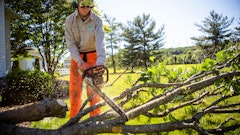
After years or often decades at the helm of a successful landscape business, there eventually comes the question: Who will take over when you’re ready to step back? Many choose to pass their business along to the next generation, and others look to sell it, but in either case, success can only be achieved through careful succession planning.
Succession planning for a family business can be loosely defined as the process used to transition the management and ownership of the business to the next generation. I have been assisting companies to do this since the 1980s. Some business owners discover that their best option is to prepare the business to eventually be sold to an outside entity and to transition themselves for life away from the business.
Either way, you’ve invested countless hours building your company to where it is today, so it’s wise to protect that investment by doing all you can to smooth the transition to a new leader (and maximize its value) when the time comes.
With succession situations, preparing the next generation is extremely important, of course. Conduct a careful analysis of the requirements of the top position and the current capabilities of the candidate. Some candidates may not understand the full scope of the opportunities and the commitment needed to operate and grow the business effectively. Most candidates lack critical delegation and other vital skills at this point, but I have found that on-site training is very helpful. The candidate needs the structured, specific-to-their-company education that empowers them to plan, organize, direct and control in a more effective way when they have the reins (rather than simply being along for the ride). They need to become good leaders, proficient in the areas of hiring, motivation, training, supervision and good decision-makers for equipment purchases, etc. There is so much for them to learn no matter how much they already know.
Here are a few additional thoughts on this topic:
- Every succession situation is unique, and relationships can be radically different, so, don’t expect that what has worked for a friend’s landscape business will work for you. Also, it is better to set your expectation that this process will have many moving parts and will take some time, so it is wise to get the ball rolling many months or even years in advance. Although sometimes the planning process moves along quicker than one expects, it’s better to be overprepared than underprepared. It is wise to put structure into the work relationship and prepare the person for success. There really needs to be a formalized plan of how everything will work as well as timing and other key matters.
- Well-defined areas of responsibility and duties are key to success.
- It's wise to enlist the help of an experienced business consultant to aid in the process of defining the roles, parameters, responsibilities and education.
- Be cautious about having a succession plan that may lead to role ambiguities when multiple family members are involved. Only one person should be in charge. Some family members who have joined the company may have grown to become excellent producers. Some may have developed strong skills and are eager for more responsibility and knowledge. However, having multiple family members involved without the proper structure in the company typically isn’t wise. Some personalities clash, and some family members (or their spouses) can become envious of the person at the top. Even though I use a variety of techniques to build harmonious family work environments, some family members are not destined to work together.
- When the time is right, prepare the other staff members properly so that they aren’t unnecessarily threatened by the changes.
For those who do not want to go the succession route but are just beginning to think about selling their business at some point down the road, it is wise to go through many of the same steps as those who are considering succession. Now is the best time to get started by analyzing your staff, marketing, facility, inventory, procedures, etc., to get an objective view of what is needed. An efficient, growing and immensely profitable landscape business with a young fleet of equipment and a very honed team will command a much higher price when you are ready to sell.




























